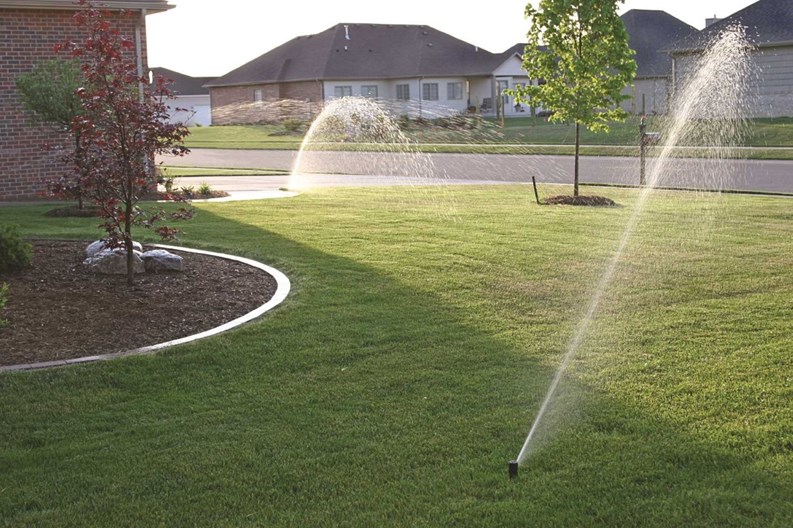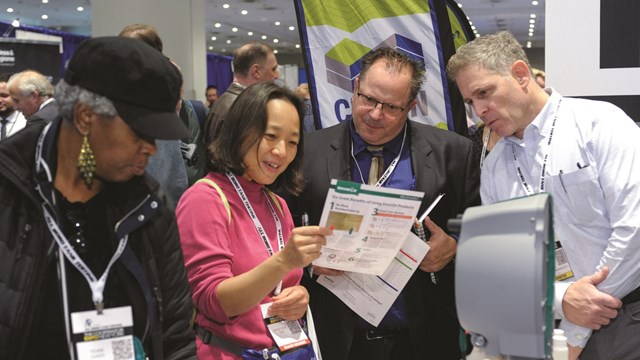One of the first things that a new homeowner learns is that ‘water is your enemy,’ because there are so many ways that water can ruin or destroy home and property. A leak can cause ceilings to chip away, pipes to burst, and pools of water to collect inside. Water can seep into rugs or behind walls, and cause mold to develop. But it’s not just inside where water can wreak havoc.
Water collecting outside a property or development can also cause all sorts of problems to develop, which is why it’s important that every condo or homeowner association pays attention to any and all drainage issues. And, it’s also crucial that drainage systems be properly maintained.
Drainage at a property is often overlooked, but when something goes wrong, the results can be devastating. There have been many cases in New Jersey of water getting into units and cars because of a poor drainage system. In the winter, there is the additional danger of water freezing into ice, which can result in a whole slew of problems.
As a result of the threat water poses to buildings and properties, boards should think about drainage issues, have money put aside for maintaining their systems annually, and prevent any costly emergencies to the property’s landscaping.
Defining Drainage
When contractors talk about drainage issues, they are normally talking about problems they see that could affect landscaping.
“When you talk about potential drainage problems, it’s something [managers and boards] better be taking seriously because the last thing a condo board wants to deal with is facing the problem after it happens,” says Paul De Nora of Advanced Plumbing & Drain Cleaning, Inc. in West Patterson. “When you say drainage, normally that would be surface water, storm drainage, rain water, etc.”
Drainage issues usually relate to standing or ponding water, which is water that’s not going away and forming puddles on the property. Other drainage issues can be the result of basement water or marshy soils.
“Usually, the problem results from conditions that begin outside but we have had issues on site that relate sometimes to sump pumps where they are moving water from the basements to the outside regularly,” says Gaetano Virone of Environmental Designers Irrigation, Inc. in Howell. “Those areas just won’t dry up and makes it difficult for drainage. If the pitch on the drainage isn’t done properly, the water will just sit there and the ground will become saturated.”
On many sites, water may collect in flat areas or the soil may simply stay saturated for long periods. This could be the result of surface depressions that allow the water to pond.
“Surface drainage problems would be something that showed itself with standing water for a standard period of time. The rule of thumb is 48 hours,” says Andrew Amorosi of Falcon Engineering in Bridgewater. “There shouldn’t be ponding water. That’s always a tell-tale sign of trouble.”
Face the Consequences
There are many consequences of poor drainage systems, and all of them can cause the value of the HOA’s property to decrease. More importantly, lawsuits can develop over accidents and property can be damaged resulting in costly repairs.
“Having poor drainage in a parking lot could lead in the winter to an icing condition, which can cause accidents,” Amorosi says. “In the lawn areas it could lead to insects breeding or rodents breeding because they like the water.”
If a lawn is constantly wet, it causes difficulty for landscapers and gardeners and even cutting the lawn in some instances can ruin landscaping equipment.
“Areas that are so bad where the water…sits there, those need to be fixed,” says Virone. “Landscapers have a lot of problems because they can’t mow properly. You get more disease on the lawn when it’s wet, a lot of leaching, chemicals and pesticides won’t work well because they will wash away and then they can re-collect together, and a lot of mold, algae, bugs and mosquitoes like those types of areas.”
Constant exposure to water can also harm a foundation, eroding and weakening concrete, in addition to causing severe damage to plants and shrubs.
“The water sitting doesn’t allow the plants to breathe. By constantly being wet, it doesn’t allow for any of that,” Amorosi says. “Obviously the aesthetics look horrible.”
What Went Wrong?
According to Virone, usually drainage problems are caused by the grade itself not being pitched properly to allow gravity to move the water away to an area that can handle it.
“What we find, believe it or not, is that the irrigation system can contribute dramatically to the water drainage problem,” he says. “It’s related to irrigation because of soil types and how the irrigation system is set to run and set to perform. If it’s not nozzled properly, meaning the water coming out of each individual head is not relative to the water coming out of the head next to it, then the irrigation system has to be run for a longer period of time to compensate for the error. What that does is, some areas get more water than other areas, because of [an] error between the different heads. That’s going to contribute to and/or cause a drainage problem because all this excess water doesn’t have a place to go.”
Solutions Abound
To control the irrigation problems resulting from sitting water, Environmental Designers suggests a solution. “We find that we can control a lot of that by how we set our irrigation timing,” Virone says. “Usually we can go in and turn a zone on and look at the water coming out of each head. As a professional I can know how badly they are matched and match precipitation relative to each other. Usually it’s fairly visible if you know what to look for.”
Part of the solution here is to cycle the watering schedule, for example six minute intervals per station for clay soils and switch from zone to zone and let the water soak in for a minimum of 30 minutes, through different levels of soil. By the time the sprinkler comes back on, it can replenish the water in the top layers of soil without causing excessive runoff, which allows the water to work its way down where it will be most beneficial.
“Usually we eliminate most of the drainage problems related to irrigation systems,” Virone says. “We can get rid of most of the water that has been sitting by setting up cycling/soak sprinkler watering programs.” In addition, you have to be wary of the water going into your plants and trees and there are ways to combat this problem as well.
“Solving drainage problems in turf, tree and landscape plantings is not a difficult task if you understand the underlying cause of the problem,” says De Nora. “You need to redirect the excess water to a lower area such as a drainage ditch, dry well or catch basin.”
Regardless of a grate’s efficacy, Amorosi says it’s necessary to keep the pipes clean of debris and leaves so things are flowing properly.
Legal Mess
In addition to property and automobiles getting damaged, which can lead to some messy legal battles, there are other dangerous drainage problems that could land you in court. There are drainage issues that keep the sidewalks or roadways wet and people can slip, causing a liability issue for the association.
“I’ve had sites so wet that we had a lawnmower flip over because water kept pouring into the area,” Virone says. “There was a lot of rain, it was constantly wet and one guy ended up at the bottom of a hill.”
The Annual Inspection
Ask any condo board member or manager who has experienced severe drainage problems on their property the one thing they wish they would have done differently, and you will get the same answer almost every time—they should have had regular maintenance checks.
“Before you see the problem is always the best time to do it,” De Nora says. “We recommend that once a year everything be cleaned and checked to avoid problems.”
To minimize the problem, if it’s the irrigation system, the most important thing is to keep an irrigation system repaired. If it’s match precipitated, well-maintained, and properly programmed, drainage problems can be decreased dramatically.
Virone says that when his company is hired for an annual or biannual check, they look at every single sprinkler again. “It’s a diagnostic check,” he says. “We can hedge ourselves on anything broken before it becomes a problem. We can see things that are broken before homeowners even know there is a problem. We can save money. One way or another we are going to fix it and, relatively speaking, it costs a lot more on a standard service call than it will on a routine check.”
Drainage issues may not be something you are thinking about, but to keep your landscaping looking good and keep trouble from happening because of excess water, it’s important that all boards plan ahead before they wind up all wet.
Keith Loria is a freelance writer and a frequent contributor to The New Jersey Cooperator.





2 Comments
Leave a Comment